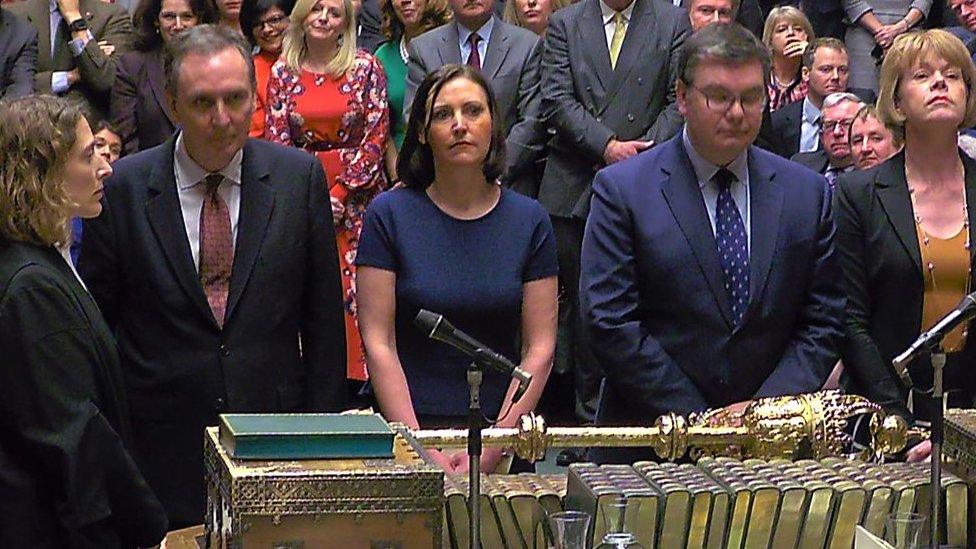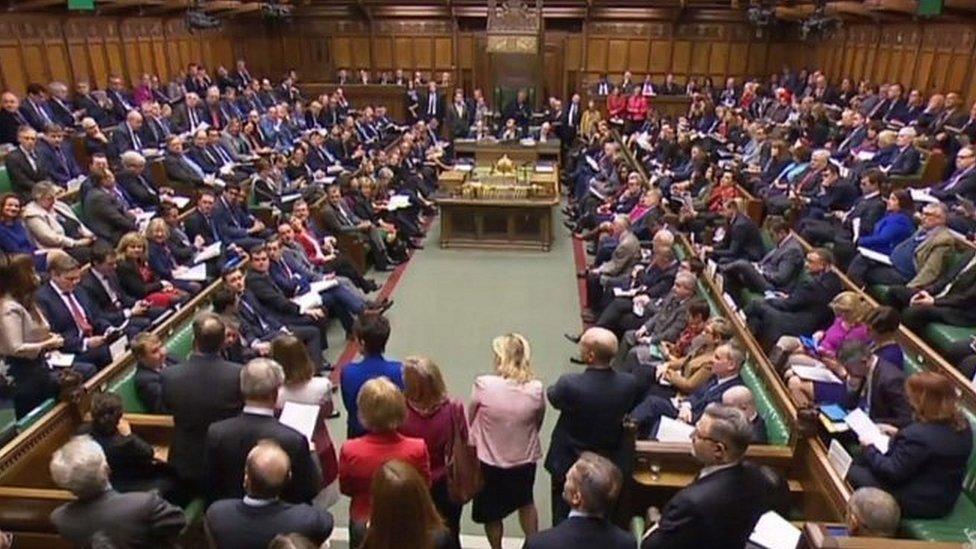Pregnant MP reignites proxy voting debate
- Published
MP delays C-section for Brexit vote
Among those crowded into the House of Commons in the picture above, for the crunch Brexit vote, is one participant who really did have somewhere else to be - heavily-pregnant Labour MP Tulip Siddiq.
That's her in the blue dress, sitting in a wheelchair, turning up to take part in the democratic process. She has revealed that she had delayed giving birth until later this week so she could vote on the deal.
Her actions have reignited the debate over proxy voting in Parliament. The UK does not have a system in place where an MP can nominate a proxy to vote on their behalf, even if they have recently become a parent - or are just about to give birth.
There is a system in Parliament for MPs who cannot make a vote called "pairing" - where an MP on either side of an issue agree to not vote, so cancelling each other out.
However, Ms Siddiq said she did not trust the system after Tory chairman Brandon Lewis was accused of breaking the system when he voted on a Trade Bill, despite being paired with Lib Dem Jo Swinson, who was on maternity leave. He later apologised for making an "honest mistake".
Ms Siddiq, who endured a difficult first pregnancy with her daughter two years ago, had been advised by doctors to have a Caesarean section on Monday or Tuesday this week, but agreed to postpone the procedure until Thursday so she could vote.
She said: "If my son enters the world even one day later than the doctors advised, but it's a world with a better chance of a strong relationship between Britain and Europe, then that's worth fighting for."
Allow X content?
This article contains content provided by X. We ask for your permission before anything is loaded, as they may be using cookies and other technologies. You may want to read X’s cookie policy, external and privacy policy, external before accepting. To view this content choose ‘accept and continue’.

The proxy voting debate
Some Twitter users have called Parliament "sexist" and "archaic".
Allow X content?
This article contains content provided by X. We ask for your permission before anything is loaded, as they may be using cookies and other technologies. You may want to read X’s cookie policy, external and privacy policy, external before accepting. To view this content choose ‘accept and continue’.

Allow X content?
This article contains content provided by X. We ask for your permission before anything is loaded, as they may be using cookies and other technologies. You may want to read X’s cookie policy, external and privacy policy, external before accepting. To view this content choose ‘accept and continue’.

Georgia Hicks tweeted: "A mother having to delay the birth of her child because there's no proxy system in place yet people will still argue that sexism isn't a thing and there is true gender equality."
Another said: "It's unbelievable in 2019 that a woman should be in this position."
However, other Twitter users criticised her decision saying she was "sacrificing her baby's health".
Allow X content?
This article contains content provided by X. We ask for your permission before anything is loaded, as they may be using cookies and other technologies. You may want to read X’s cookie policy, external and privacy policy, external before accepting. To view this content choose ‘accept and continue’.

Allow X content?
This article contains content provided by X. We ask for your permission before anything is loaded, as they may be using cookies and other technologies. You may want to read X’s cookie policy, external and privacy policy, external before accepting. To view this content choose ‘accept and continue’.

Chris Beach argued she needed to "make way for other MPs" if she couldn't do her job due to a "personal life choice".
Allow X content?
This article contains content provided by X. We ask for your permission before anything is loaded, as they may be using cookies and other technologies. You may want to read X’s cookie policy, external and privacy policy, external before accepting. To view this content choose ‘accept and continue’.

@moet_medic tweeted: "It's an elective procedure, not an emergency, therefore it's like delaying any day case procedure like a carpal tunnel release. If it were an emergency, she would not be able to delay it. This is another cry for media attention."
Fellow Labour MP Harriet Harman said Ms Siddiq "should not have to choose" between her caesarean and her vote. She received a mixed response on Twitter.
Allow X content?
This article contains content provided by X. We ask for your permission before anything is loaded, as they may be using cookies and other technologies. You may want to read X’s cookie policy, external and privacy policy, external before accepting. To view this content choose ‘accept and continue’.

Allow X content?
This article contains content provided by X. We ask for your permission before anything is loaded, as they may be using cookies and other technologies. You may want to read X’s cookie policy, external and privacy policy, external before accepting. To view this content choose ‘accept and continue’.

Commons Speaker John Bercow said that a proxy vote for Ms Siddiq would be his "preference", but it was not in his power to grant it. However, he was happy for her to be "nodded through".
This process normally means an MP's vote can be counted if they are anywhere on the parliamentary estate, rather than going through the voting lobby.
After the Brexit vote, SNP health spokeswoman Philippa Whitford raised the issue in the Commons.
She said Ms Siddiq was due to have a Caesarean section because she has a "high risk" pregnancy and gestational diabetes.
Dr Whitford told the Commons on a point of order after the Brexit vote: "I have to say, as a doctor, to put our colleague at risk - and her baby at risk - because we cannot have a method of allowing those who are sick or pregnant (to vote) is disgraceful."
Related topics
- Published15 January 2019

- Published14 January 2019

- Published8 March 2018
